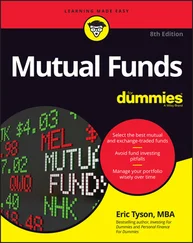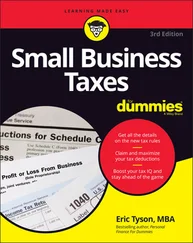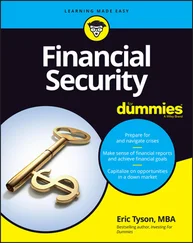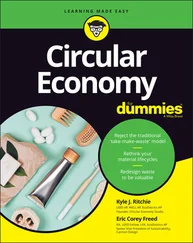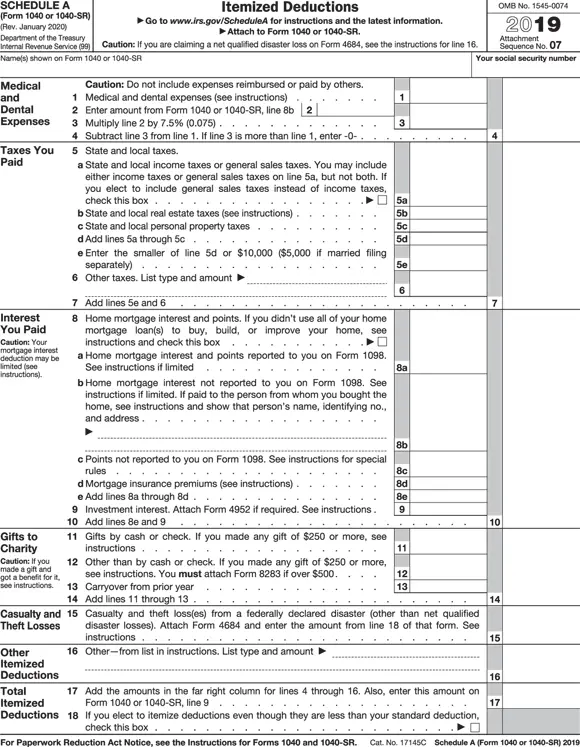
Source: U.S. Internal Revenue Service
FIGURE 3-2:Itemize mortgage interest and property tax deductions on Schedule A of your 1040.
Effective 2018, due to the Tax Cuts and Jobs Act, the tax benefits of home ownership were further limited, especially for those buying more expensive properties subject to higher property tax bills. The biggest change is that property taxes combined with your state income tax are now limited to a $10,000 annual deduction. And, the mortgage interest deduction now may be claimed on up to $750,000 of mortgage debt (or $1,000,000 if indebtedness was incurred prior to December 16, 2017), which obviously doesn’t affect most home buyers.
Just because mortgage interest and property taxes are allowable deductions on your income tax return, don’t think that the government is literally paying for these items for you. Consider that when you earn a dollar of income and must pay income tax on that dollar, you don’t pay the entire dollar back to the government in taxes. Your tax bracket (see Table 3-2) determines the amount of taxes you pay on that dollar.
TABLE 3-22020 Federal Income Tax Brackets and Rates
| Federal Tax Rate |
For Single Individuals, Taxable Income Over |
For Married Individuals Filing Joint Returns, Taxable Income Over |
For Heads of Households, Taxable Income Over |
| 10% |
$0 |
$0 |
$0 |
| 12% |
$9,875 |
$19,750 |
$14,100 |
| 22% |
$40,125 |
$80,250 |
$53,700 |
| 24% |
$85,525 |
$171,050 |
$85,500 |
| 32% |
$163,300 |
$326,600 |
$163,300 |
| 35% |
$207,350 |
$414,700 |
$207,350 |
| 37% |
$518,400 |
$622,050 |
$518,400 |
Because of the new tax bill, determining the tax savings you may realize from homeownership has become much more complicated. Here’s a shortcut that works reasonably well in determining your tax savings in homeownership: Multiply your federal-tax rate (which we explain in a moment) by the portion of your property taxes up to $10,000 when combined with your annual state income tax payments, and the portion of your mortgage payment on up to $750,000 of mortgage debt.
 Even if you’re under the $750,000 threshold, not all your mortgage payment is tax-deductible — only the portion of the mortgage payment that goes toward interest. Technically, you pay federal and state taxes, so you should consider your state tax savings as well when calculating your homeownership tax savings. However, to keep things simple and still get a reliable estimate, simply multiply your mortgage payment and property taxes by your federal income tax rate. This shortcut works well because the small portion of your mortgage payment that isn’t deductible (because it’s for the loan repayment) approximately offsets the overlooked state tax savings.
Even if you’re under the $750,000 threshold, not all your mortgage payment is tax-deductible — only the portion of the mortgage payment that goes toward interest. Technically, you pay federal and state taxes, so you should consider your state tax savings as well when calculating your homeownership tax savings. However, to keep things simple and still get a reliable estimate, simply multiply your mortgage payment and property taxes by your federal income tax rate. This shortcut works well because the small portion of your mortgage payment that isn’t deductible (because it’s for the loan repayment) approximately offsets the overlooked state tax savings.
If you want to more accurately determine how homeownership may affect your tax situation, get out your tax return and try plugging in some reasonable numbers to estimate how your taxes will change. You can also speak with a tax advisor.
| Item |
Estimated Monthly Expense |
| Mortgage payment |
$ |
| Property taxes |
+ $ |
| Insurance |
+ $ |
| Improvements, maintenance, and other |
+ $ |
| Homeownership expenses (pretax) |
= $ |
| Tax savings |
– $ |
| Homeownership expenses (after tax benefits) |
= $ |
 The deductibility of the mortgage interest on up to $750,000 borrowed covers debt on both your primary residence and a second residence. (Buying and maintaining two homes is an expensive proposition and something few people can afford, so don’t get any silly ideas from our mentioning this tax tidbit!)
The deductibility of the mortgage interest on up to $750,000 borrowed covers debt on both your primary residence and a second residence. (Buying and maintaining two homes is an expensive proposition and something few people can afford, so don’t get any silly ideas from our mentioning this tax tidbit!)
Congratulations! You’ve totaled what your dream home should cost you on a monthly basis after factoring in the tax benefits of homeownership. Don’t forget to plug these expected homeownership costs into your current monthly spending plans (see Chapter 2) to make sure you can afford to spend this much on a home and still accomplish your financial goals.
On the day when a home becomes yours officially, known as closing day, many people (in addition to the seller) will have their hands in your wallet. Myriad one-time closing costs can leave you poorer or send you running to your relatives for financial assistance.
We don’t want you to be unable to close your home purchase or be forced to get down on your hands and knees and beg for money from your mother-in-law. (Not only is such groveling hard on your ego, but also, she may expect grandchildren pronto.) Advance preparation for the closing costs saves your sanity and your finances.
 Here are some typical closing costs (listed from those that are usually largest to those that are typically tiniest) and how much to budget for each (exact fees vary by property cost and location).
Here are some typical closing costs (listed from those that are usually largest to those that are typically tiniest) and how much to budget for each (exact fees vary by property cost and location).
Loan origination fees (points) and other loan charges: These fees and charges range from nothing to 3 percent of the amount borrowed. Lenders generally charge all sorts of fees for things such as appraising the property, pulling your credit report, preparing loan documents, and processing your application, as well as charging a loan origination fee, which may be 1 or 2 percent of the loan amount. If you’re strapped for cash, you can get a loan that has few or no fees; however, such loans have substantially higher interest rates over their lifetimes. As Chapter 12explains, you may be able to cut a deal with the seller to pay these loan-closing costs.
Escrow fees: Escrow fees range from several hundred to over a thousand dollars, based on your home’s purchase price. These fees cover the cost of handling all the purchase-related documents and funds. We explain escrows in much more detail in Chapters 9and 14.
Homeowners insurance: This insurance typically costs several hundred to a thousand-plus dollars per year, depending on your home’s value and how much coverage you want. As we discuss earlier in this chapter, you can’t get a mortgage unless you prove to the lender that you have adequate homeowners insurance coverage. Promising to get this coverage isn’t enough; lenders usually insist that you pay the first year’s premium on said insurance policy at closing.
Title insurance: This insurance typically costs several hundred to a thousand dollars, depending on the home’s purchase price. Lenders require that you purchase title insurance when you buy your home to make sure you have clear, marketable title to the property. Among other things, title insurance protects you and the lender against the remote possibility that the person selling you the home doesn’t legally own it. We discuss title insurance in detail in Chapter 13.
Property taxes: These taxes typically cost several hundred to a couple thousand dollars and are based on the home’s purchase price and the date that escrow closes. At the close of escrow, you may have to reimburse the sellers for any property taxes that they paid in advance. For example, suppose that (before they sell their home to you) the sellers have already paid their property taxes through June 30. If the sale closes on April 30, you owe the sellers two months’ property taxes — the tax collector won’t refund the property taxes already paid for May and June.
Читать дальше
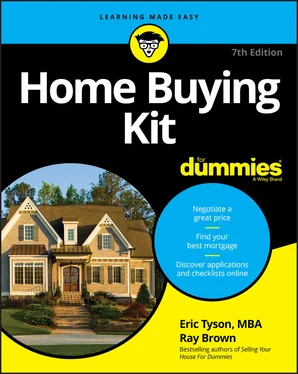

 Even if you’re under the $750,000 threshold, not all your mortgage payment is tax-deductible — only the portion of the mortgage payment that goes toward interest. Technically, you pay federal and state taxes, so you should consider your state tax savings as well when calculating your homeownership tax savings. However, to keep things simple and still get a reliable estimate, simply multiply your mortgage payment and property taxes by your federal income tax rate. This shortcut works well because the small portion of your mortgage payment that isn’t deductible (because it’s for the loan repayment) approximately offsets the overlooked state tax savings.
Even if you’re under the $750,000 threshold, not all your mortgage payment is tax-deductible — only the portion of the mortgage payment that goes toward interest. Technically, you pay federal and state taxes, so you should consider your state tax savings as well when calculating your homeownership tax savings. However, to keep things simple and still get a reliable estimate, simply multiply your mortgage payment and property taxes by your federal income tax rate. This shortcut works well because the small portion of your mortgage payment that isn’t deductible (because it’s for the loan repayment) approximately offsets the overlooked state tax savings. The deductibility of the mortgage interest on up to $750,000 borrowed covers debt on both your primary residence and a second residence. (Buying and maintaining two homes is an expensive proposition and something few people can afford, so don’t get any silly ideas from our mentioning this tax tidbit!)
The deductibility of the mortgage interest on up to $750,000 borrowed covers debt on both your primary residence and a second residence. (Buying and maintaining two homes is an expensive proposition and something few people can afford, so don’t get any silly ideas from our mentioning this tax tidbit!) Here are some typical closing costs (listed from those that are usually largest to those that are typically tiniest) and how much to budget for each (exact fees vary by property cost and location).
Here are some typical closing costs (listed from those that are usually largest to those that are typically tiniest) and how much to budget for each (exact fees vary by property cost and location).